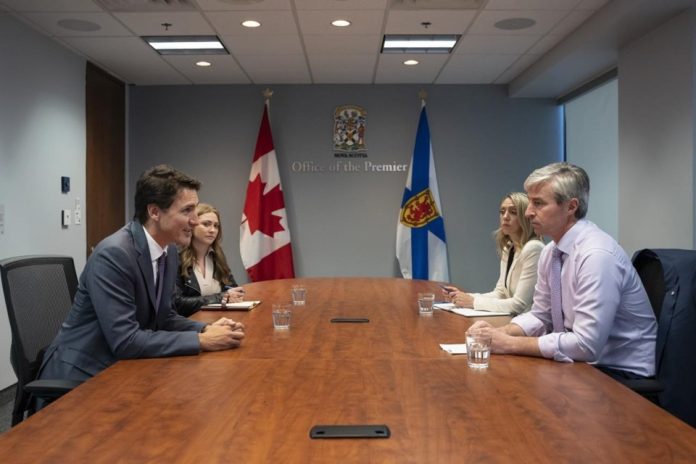Half of Canada’s provinces have now formally signed on to the new health-care deal proposed by the federal government two weeks ago, and more will join them next week, Intergovernmental Affairs Minister Dominic LeBlanc said Thursday.
But the “agreements in principle” now in place with Ontario and all four Atlantic provinces are just the first step to completing the $196-billion, 10-year health-care funding proposal that Prime Minister Justin Trudeau made on Feb. 7.
To get the money, all five provinces must still come up with specific plans showing how they will spend it and how they will prove to Canadians that their health-care systems are getting better.
Almost one-quarter of the money — $46 billion — is contingent on each province or territory agreeing to Ottawa’s conditions. That includes that they upgrade their health-care data systems and target some funding to primary care, mental health, recruiting and retaining workers, and dealing with surgical backlogs.
Ontario, Newfoundland and Labrador, Prince Edward Island, Nova Scotia and New Brunswick will now begin negotiating more specific plans. The initial targets will cover the first three years of the 10-year agreement.
Some of those plans will be unique to each jurisdiction and based on their current priorities, Trudeau said. One province could say they want 95 per cent of their residents to have access to a family doctor, while another province could say that 75 per cent would be a big improvement.
“If they choose to get 75 per cent they will have to explain to their citizens why they’re accepting that one-quarter of their citizens won’t have access to primary care,” he said. “But we’re looking for ambitious targets that are reasonable for them, that they can hit, that they can be accountable to, that will improve access to primary care in a significant way.”
There will be no wiggle room for provinces on the requirement to overhaul health data systems, including patient digital records, Trudeau said.
“For data, we need to make sure that people are developing sophisticated data systems that allow them to empower their health community to have the proper information on all the patients they’re treating, and be comparable, and give us a national picture of how health is doing in Canada with clear outcomes and numbers,” he said.
LeBlanc said it is critical that health records be accessible across medical professions and between provinces, citing his own personal health-care battle with lymphoma.
After successfully completing treatment for one cancer in 2017, LeBlanc was diagnosed with a second, and very rare, form of lymphoma two years later. His primary care teams were in his home province of New Brunswick but he underwent a stem cell transplant in Montreal.
“I am an example of the Quebec health-care system’s success and the work that doctors in New Brunswick can do with doctors in Quebec to treat patients across the country,” LeBlanc said.
He and Health Minister Jean-Yves Duclos were in Quebec City on Thursday, to discuss the health proposal with the Quebec government. Over the past two weeks, they have also met with the governments of the nine other provinces and the three territories.
LeBlanc said all the meetings went well.
“There is a great deal in common,” he said, adding he expects more agreements to be signed with at least some of the remaining five provinces and three territories next week.
The provinces are responsible for delivering health care in Canada, but the federal government has contributed some of the funding since universal public health care was first developed more than 50 years ago.
The premiers have long asked Ottawa to increase its share to 35 per cent of their costs. Currently Ottawa covers about 22 per cent, they said.
Trudeau’s offer was nowhere close to the premiers’ request, but all provinces and territories have said they’ll take the deal because they can’t afford to turn it down.
The $46 billion in new money being offered is divided into multiple areas. The first $2 billion will be issued by the end of March as a one-time top up to the annual Canada Health Transfer that Ottawa sends to the provinces.
While the federal government is suggesting provinces use it to ease the pressure in children’s hospitals and emergency rooms, the transfer comes with almost no strings attached. The main one is that provinces follow the principles of the Canada Health Act, including not charging patients directly for services the act says must be covered by the public purse.
Another $17 billion will go to increase the federal transfer faster than planned over the next 10 years.
And $25 billion is being set aside for the one-on-one deals on specific priorities.
The transfers will be divided by population as usual, but the bilateral money will see smaller provinces get a bigger share than expected, as the federal government recognizes a per capita share is not always enough for smaller provinces to keep up.
The agreements signed Thursday will see Ontario get $8.4 billion for its bilateral arrangement, while Nova Scotia will receive $1 billion, New Brunswick $900 million, Newfoundland $749 million, and P.E.I. $288 million.
































